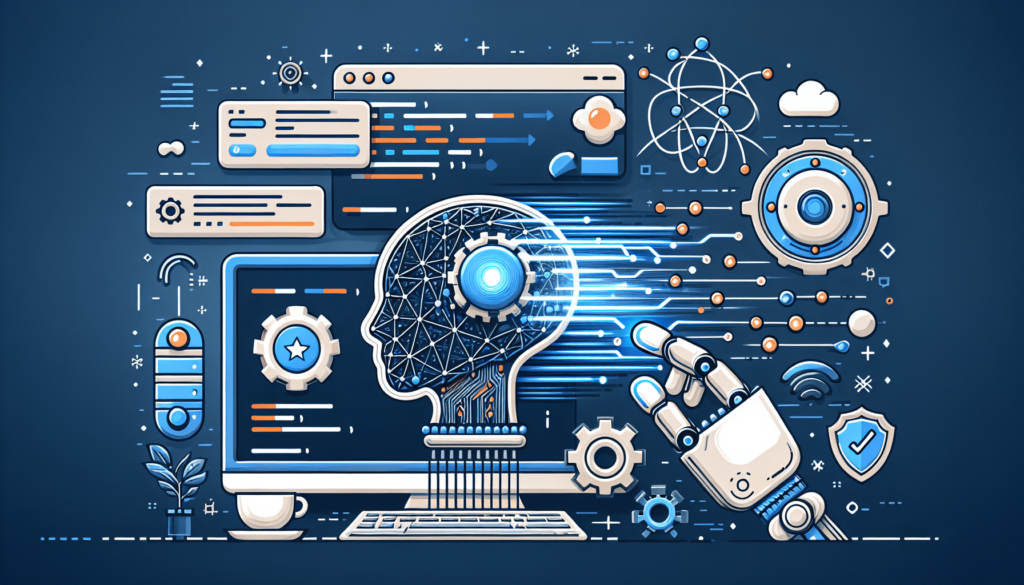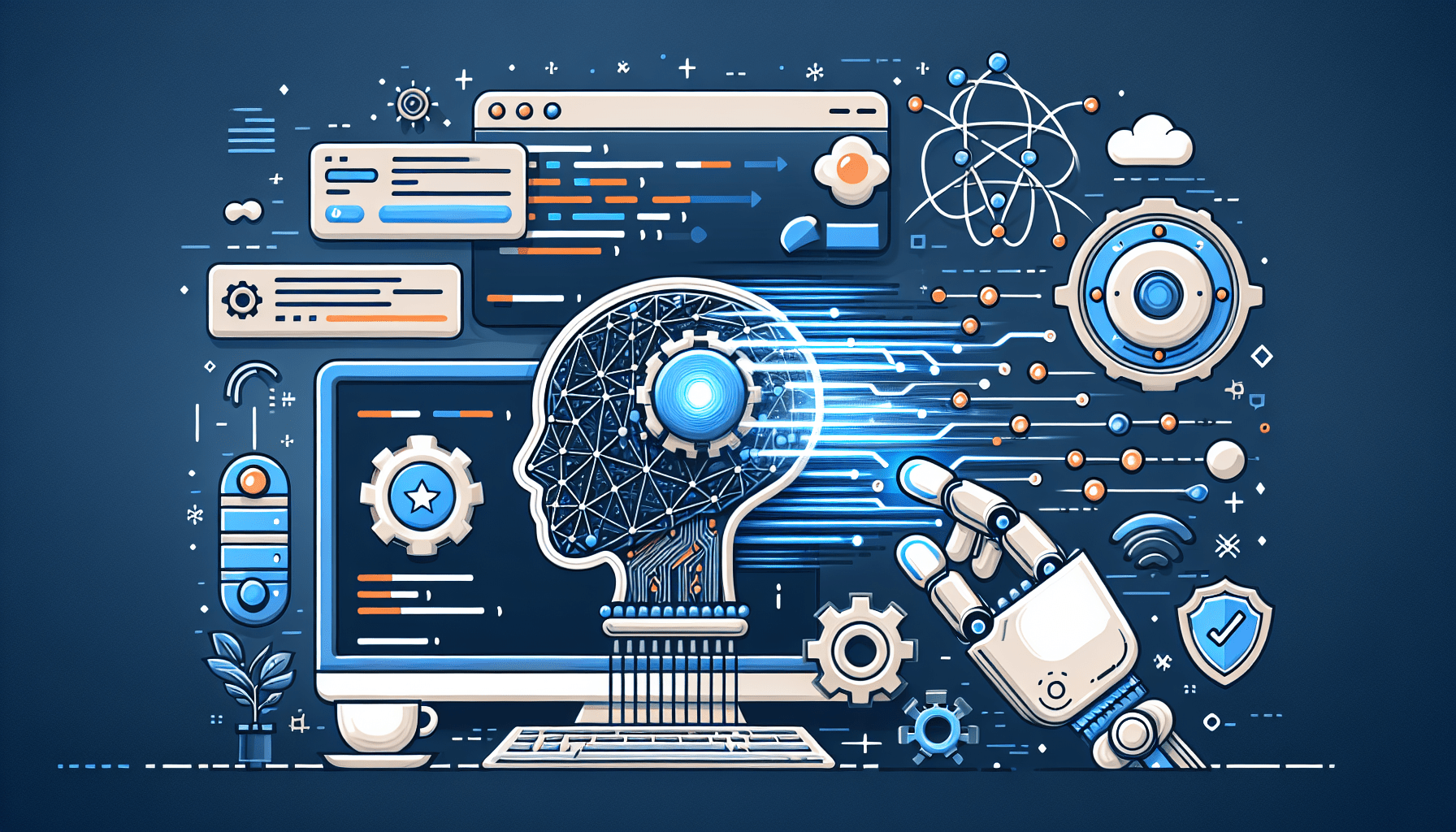In the ever-evolving landscape of web development, the efficacy of testing applications thoroughly and efficiently remains paramount. However, traditional methods can be time-consuming, expensive, and prone to human error. Enter artificial intelligence (AI), which has emerged as a game-changing technology in the field of web application testing. By harnessing the power of machine learning and automation, AI is transforming the way testing is conducted, enabling developers to streamline processes, enhance accuracy, and ultimately deliver higher quality web applications. This article explores the revolutionary impact of AI on web application testing and the benefits it brings to the table.

Automated Test Case Generation
Automated test case generation is a crucial aspect of web application testing that has been greatly enhanced through the integration of artificial intelligence (AI) technologies. With AI, identifying the appropriate test cases becomes a streamlined process. AI algorithms can analyze the requirements and specifications of the web application, as well as the codebase, to automatically generate test cases that cover different scenarios and functionalities. This eliminates the need for manual test case creation, saving time and effort in the testing process.
Identification of test cases
The identification of test cases is a critical step in ensuring comprehensive test coverage. AI algorithms can analyze the requirements and specifications of the web application, as well as the codebase, to identify the most relevant and critical test cases. By leveraging machine learning techniques, AI algorithms can learn from past test cases and identify patterns to improve the accuracy and efficiency of test case identification.
Selection of test data
Another area where AI has greatly improved web application testing is in the selection of appropriate test data. AI algorithms can analyze the data dependencies in the web application and generate test data that covers different scenarios and edge cases. By using intelligent data generation techniques, AI can ensure that the test data is diverse and representative of real-world scenarios, leading to more effective and robust testing.
Execution of test cases
AI-powered test automation frameworks have revolutionized the execution of test cases. These frameworks can automatically execute the identified test cases, simulate user interactions, and validate the expected outcomes. By leveraging AI techniques such as machine learning and natural language processing, these frameworks can adapt to changes in the web application and intelligently handle variations in the expected outcomes. This leads to faster, more efficient, and more reliable testing processes.
Improved Test Coverage
Test coverage is a crucial aspect of web application testing. AI has introduced innovative techniques to improve test coverage and ensure that all critical functionalities and scenarios are tested thoroughly.
Explorative testing
Explorative testing is a technique that involves testing the application by exploring different functionalities and scenarios in an ad-hoc manner. AI can greatly enhance exploratory testing by intelligently suggesting areas of the application to explore based on previous test results and user feedback. By leveraging machine learning algorithms, AI can provide testers with valuable insights and suggestions, allowing them to uncover hidden defects and vulnerabilities.
Edge case detection
Edge cases are scenarios that lie at the extremes of the input domain and are often overlooked during traditional testing. AI can automatically detect and generate test cases for edge scenarios, ensuring that the web application is tested thoroughly under different conditions. By identifying and testing these edge cases, AI can uncover potential vulnerabilities and weaknesses that may go unnoticed during manual testing.
Regression testing
Regression testing is an essential aspect of web application testing that ensures that existing functionalities are not affected by code changes or updates. AI-powered test automation frameworks can intelligently select and execute regression test cases, reducing the manual effort required for regression testing. By automating the regression testing process, AI enables faster and more efficient testing cycles, allowing for faster software releases without compromising quality.
Faster Test Execution
In addition to improving test coverage, AI has also contributed to faster test execution, enabling organizations to speed up their software release cycles and enhance their overall efficiency.
Parallel test execution
AI-powered test automation frameworks can execute multiple test cases in parallel, leveraging the computing power of modern hardware. By distributing the test execution across multiple machines or cores, AI can significantly reduce the time required for test execution, enabling faster feedback cycles and shorter test cycles.
Reduced test cycle time
The ability of AI to automatically generate test cases and select test data greatly reduces the time required for test case creation and preparation. With AI, testers can focus on executing the test cases rather than spending time on manual test case creation and data selection. This leads to faster test cycles and allows organizations to release software updates at a much faster pace.
Efficient resource utilization
AI-powered test automation frameworks can intelligently allocate testing resources based on the priority of test cases and available computing resources. By optimizing the resource utilization, AI ensures that the most critical test cases are executed first, reducing the time taken for testing and maximizing the efficiency of testing resources. This not only speeds up the testing process but also ensures that resources are utilized effectively.
Reduced Manual Effort
One of the key benefits of AI in web application testing is the reduction in manual effort required for various testing activities. AI automates several time-consuming and repetitive tasks, allowing testers to focus on more strategic aspects of testing.
Test case creation and maintenance
AI-powered tools can automatically generate test cases based on the requirements and specifications of the web application. These tools can analyze the application’s behavior and generate test cases that cover different scenarios and functionalities. Additionally, AI can also help in maintaining test cases by intelligently updating them as the application evolves, reducing the manual effort required for test case maintenance.
Test data generation
Test data generation is often a laborious and time-consuming task. AI can automate the generation of test data by analyzing the data dependencies in the web application and generating representative test data. By leveraging AI techniques, testers can save significant time and effort in selecting and preparing test data, enabling them to focus on more critical aspects of testing.
Test result analysis
AI can automate the analysis of test results, providing valuable insights into the quality of the web application. AI algorithms can analyze the test results, identify patterns, and detect anomalies or potential defects. By automating the test result analysis, AI allows testers to quickly and accurately identify areas that require further investigation, reducing the manual effort required for result analysis.
Enhanced Accuracy and Reliability
AI brings a significant improvement in the accuracy and reliability of web application testing by eliminating human errors and ensuring consistent and thorough test execution.
Eliminating human errors
Human errors are an inherent risk in manual testing. AI-powered test automation frameworks eliminate human errors by executing test cases with precision and accuracy. By automating repetitive tasks and eliminating human intervention, AI ensures that the test results are consistent and reliable.
Consistent test execution
AI can ensure consistent test execution by eliminating variations caused by human testers. AI-powered test automation frameworks can simulate user interactions and test the application in a consistent and repeatable manner. This ensures that the test results are consistent across different test cycles, enabling accurate comparison and analysis.
Improved defect identification
With the assistance of AI, testers can enhance their defect detection capabilities. AI algorithms can analyze the test results, identify patterns, and detect anomalies that may indicate the presence of defects. By automating defect identification, AI enables faster and more accurate detection of defects, allowing organizations to address them promptly and improve the overall quality of the web application.
Real-time Monitoring and Reporting
Real-time monitoring and reporting play a crucial role in ensuring the effectiveness of web application testing. AI enables continuous testing and provides timely notifications and detailed reports to facilitate effective decision-making.
Continuous test execution
AI-powered test automation frameworks can continuously monitor the web application, executing test cases as changes are made to the application. This allows for real-time detection of defects and vulnerabilities, providing organizations with immediate feedback on the quality of their web application. By enabling continuous testing, AI helps organizations identify and address issues early in the development lifecycle, reducing the overall cost and effort required for defect resolution.
Alerts and notifications
AI-powered test automation frameworks can provide real-time alerts and notifications when critical defects or vulnerabilities are detected. These alerts and notifications enable quick response and remediation, helping organizations prioritize and address issues promptly. By providing timely feedback, AI improves the efficiency of defect resolution and helps organizations deliver high-quality web applications.
Detailed test reports
AI can generate detailed test reports that provide comprehensive insights into the quality of the web application. These reports can include information on test coverage, test results, defect identification, and other relevant metrics. By providing detailed test reports, AI enables organizations to assess the effectiveness of their testing processes, make data-driven decisions, and continuously improve the quality of their web applications.

Optimized Test Environment
An optimized test environment is crucial for effective web application testing. AI can help organizations create and maintain a dynamic test environment that supports efficient and accurate testing.
Dynamic test environment setup
AI can automate the setup and configuration of the test environment, allowing testers to quickly and easily create the necessary infrastructure for testing. By automating the environment setup, AI reduces the manual effort required for environment configuration, enabling testers to focus on more critical aspects of testing.
Software and hardware compatibility
Testing on different software and hardware configurations is essential to ensure the compatibility and robustness of the web application. AI can automate the execution of tests on various software and hardware configurations, ensuring that the application performs as expected across different environments. By automating compatibility testing, AI allows organizations to identify and address compatibility issues early in the development lifecycle, reducing the risk of issues in production.
Load testing simulations
AI-powered load testing simulations can simulate a high volume of concurrent users accessing the web application, allowing organizations to gauge the scalability and performance of the application. By generating realistic load scenarios, AI helps organizations identify potential performance bottlenecks and optimize the application for scalability. This ensures that the web application can handle the expected user load without compromising performance or stability.
Intelligent Defect Prediction
AI enables organizations to identify and predict defects early in the development lifecycle, allowing for timely resolution and improved overall quality.
Early defect identification
By analyzing historical test data and monitoring the web application in real-time, AI algorithms can detect patterns and anomalies that may indicate the presence of defects. By identifying potential defects early, organizations can address them before they manifest into critical issues, reducing the overall cost and effort required for defect resolution.
Root cause analysis
AI-powered tools can conduct root cause analysis to identify the underlying causes of defects. By analyzing test data, changes in the application, and other relevant factors, AI can pinpoint the root cause of defects, allowing organizations to address the underlying issues and prevent similar defects in the future.
Quality statistics prediction
AI algorithms can leverage historical test data to predict quality statistics, such as defect density, defect arrival rate, and defect removal efficiency. By predicting quality statistics, organizations can proactively identify areas that require attention and allocate resources accordingly. This enables organizations to optimize their testing processes and improve the overall quality of their web applications.
Enhanced Security Testing
Security is a crucial aspect of web application testing, and AI has greatly enhanced the effectiveness of security testing through advanced techniques and capabilities.
Vulnerability scanning
AI-powered vulnerability scanning tools can automatically identify potential security vulnerabilities in the web application. By analyzing the application’s code and configurations, AI algorithms can detect common security flaws and vulnerabilities, such as SQL injection, cross-site scripting, and insecure authentication mechanisms.
Security rule validation
AI can validate security rules and policies defined for the web application. By analyzing the application’s behavior and configurations, AI algorithms can ensure that the implemented security measures comply with industry standards and best practices. By validating security rules, AI helps organizations identify and address potential security gaps, enhancing the overall security of their web applications.
Penetration testing
AI-powered penetration testing tools can simulate real-world attacks and attempt to exploit vulnerabilities in the web application. By automating the penetration testing process, AI enables organizations to identify and address potential security weaknesses before malicious attackers exploit them. This helps organizations proactively protect their web applications against potential threats and ensure the security and integrity of user data.
Increased Test Reusability
Test reusability is a crucial factor in optimizing the testing process and reducing effort and cost. AI can enhance test reusability through modular test design and the creation of reusable test components.
Modular test design
AI enables the creation of modular test designs, where test cases are organized into independent modules that can be reused across different test scenarios. This modular approach allows for efficient test case creation, as individual modules can be combined to create comprehensive test scenarios. Additionally, modular test designs facilitate easier maintenance and updating of test cases, leading to improved overall test reusability.
Reusable test components
AI-powered test automation frameworks can create reusable test components that can be easily integrated into different test scenarios. These test components can be developed using AI techniques to simulate user interactions and perform common testing tasks. By reusing these test components, organizations can significantly reduce the effort required for test case creation and maintenance, leading to improved overall test reusability.
Regression test suite
AI can optimize the creation and maintenance of regression test suites, which contain a set of test cases that ensure that existing functionalities are not affected by code changes or updates. By automatically selecting and executing the most relevant regression test cases, AI enables organizations to maintain a comprehensive regression test suite that can be reused across different releases. This ensures that the web application remains stable and reliable even after changes are made, without the need for extensive manual effort.



